This study explores the gender and educational differences in the time spent on childcare in the Czech Republic. In particular, we ask how gender and educational gradients in parenting time intersect and whether they vary by the child’s age. We consider the time parents spend in basic, interactive and focused childcare care as a way to address the intensive parenting model.
Topic: care, parenting, family
Czech Social Attitudes in the European Context: In the Heart of Europe reflects the political, welfare, and general social attitudes in the Czech Republic, which has 30 years of existence, in European comparison.
Topic: trust/social cohesion, EU, human relations, politics (and political attitudes), social inequalities, public opinion
Despite a long and rich history of fear of crime research, studies which focus on the importance of local specifics are rather limited. This study fills this gap by analyzing fear of crime—measured as concerns about crime and feeling of safety—among residents of disadvantaged neighborhoods.
Topic: crime
Zpráva dostupná na vyžádání na e-mailové adrese: eva.krulichova@soc.cas.cz.
Topic: crime
Souhrnná výzkumná zpráva obsahuje popis projektu, jeho metodologii a analýzu výsledků výzkumu přímé a nepřímé zkušenosti s korupcí v různých sektorech České republiky. Zaměřuje se na sektory školství a vědy, zdravotnictví, sportu, veřejných zakázek, exekucí a stavebního a územního řízení, v každém sektoru popisuje stav a formy korupce a nabízí doporučení pro zlepšení situace s korupcí.
Topic: crime, human relations
Topic: crime, human relations
Topic: family
The aim of the present study is to thoroughly examine the relationship between adolescent fear of crime and a wide variety of offences which commonly affect children. The analysed data comes from the Urban Youth Victimization Survey conducted among 9th grade students in the Czech Republic. The results unequivocally demonstrate that victimization experience, when measured properly, substantially affects adolescent fear of crime.
Topic: crime
Topic: social inequalities, social policy
This study focuses on home-leaving pathways that have unfolded over a 5-year period after leaving home. It explores the association between socioeconomic background (parental education) and the long-term, solo-living, home-leaving pathways of young men and women across 29 European countries.
Topic: family
Based on data from the European Social Survey (2018), this paper examines ideas about the ideal age to become a parent in 28 European countries. Using multi-level models, it assesses the impact of real timing of childbirth and childlessness acceptance at the country level while controlling for individual characteristics. The findings show that the variability of ideas about ideal age at the country level is relatively limited and correlates significantly with the real timing of childbearing.
Topic: gender, parenting
The main objective of this study is to examine interest in the implementation of five restorative justice programs as reported by 225 employes of the Prison Service of the Czech Republic and to identify the factors that underpin such interest. The results show that perceived usefulness and familiarity with the program are crucial factors that influence the respondent's interest in program implementation.
Topic: crime
Christianity has lost its salience, but customs and traditions maintained their importance in forming national identity in Europe. Using the ISSP National Identity 2003 and 2013 data from 17 European countries, this article tests how the salience of Christianity and sharing of national customs and traditions varies according to the share of Muslim and immigrant population, and whether the association changed across time.
Topic: identity, kultura, religion and religiosity
Previous research on non-custodial sentences has pointed to the association between awareness of alternatives to prison and public opinion on these alternative measures. Using data from a public opinion survey conducted in the Czech Republic in 2018, the main objective of this study is to examine the extent to which public opinion on probation is influenced by awareness of probation service and support for probation in general.
Topic: crime, public opinion
Our chapter aims to describe the contemporary civic values of the people of Czech Republic within a European perspective. The following indicators have been chosen to represent activities, attitudes, and values that may sustain a democratic civic political culture: political interest, feelings of political efficacy and active participation in civil society and politics.
Topic: trust/social cohesion, gender, value orientations, kultura, human relations, civil society, politics (and political attitudes), social capital
The Erasmus programme was established in 1987, Erasmus has become the largest international student mobility programme in the world and is seen by Europeans as one of the most positive results achieved by the European Union. The chapter reviews, first, the literature on the motivations of students and institutions to take part in the Erasmus programme and its effects.
Topic: education
For decades, social stratification research has focused on the effect of families’ cultural capital on their offspring’s educational attainment. However, few studies have focused on the shaping of individuals’ cultural capital. This study aimed to examine the effects of family background, individual, partner, and household characteristics on individuals’ reading preferences and cultural participation.
Topic: gender, kultura, social inequalities
The proportion of people seeking a partner later in life has increased in recent decades. However, studies exploring age variation in partner preferences are quite rare. We aim to fill this gap by examining the partner preferences for household care skills, financial resources, and education of unpartnered individuals aged 19–65 years (n = 1145) who participated in speed-dating events in the Czech Republic.
Topic: gender, family
Recently, there has been growing interest in crime-related determinants of subjective well-being (SWB). The existing findings are, however, rather contradictory. The relationship between the aforementioned phenomena is most often examined using cross-sectional data, although it seems their development over time might be interlinked. Moreover, only limited attempts have been made to address the multidimensionality of SWB.
Topic: crime, standard of living
Současná sociologie si klade otázky, kde, jak a proč vznikají rizika, jak je produkuje nebo konstruuje sama společnost a jak se promítají do jedincovy každodennosti. Na jedné straně stojí rizika jako terorismus či korupce, s nimiž se jednotlivci potýkají jen vzácně, která ale mění podobu celé společnosti.
Topic: value orientations, corruption


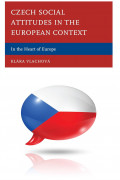
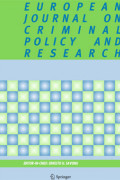
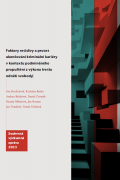

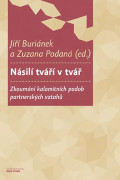
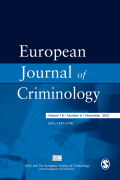
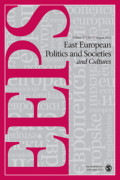
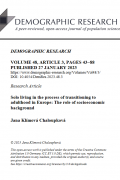

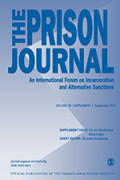
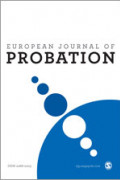
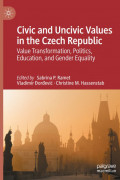
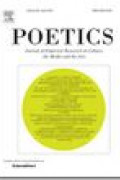
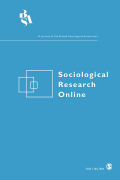
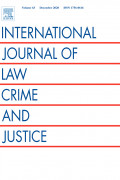
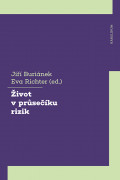
Newsletter
Facebook
X
Tweets by SociologickyNewsletter